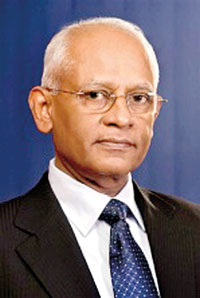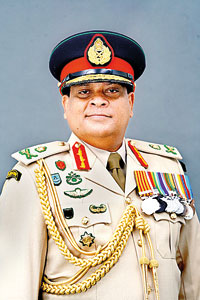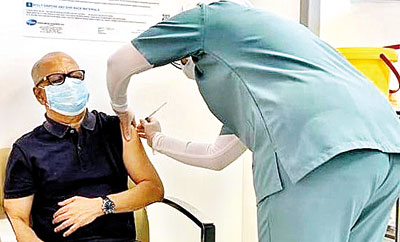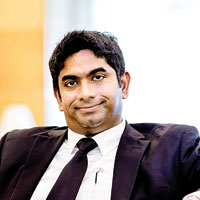News
Vital aspects being drawn up in National Vaccination Deployment Plan
A crystal clear National Vaccination Deployment Plan (NVDP) covering all vital aspects is being drawn up, the Sunday Times learns, with health officials looking at the Electoral Register to get accurate and up-to-date data when selecting the target group for vaccines.
Conceding that there is much work to be done, the Principal Advisor to the President, Lalith Weeratunga who is heading the Presidential Task Force on Vaccines said that he hopes to see a lot completed by Tuesday.

Lalith Weeratunga
At 5 p.m. every Tuesday, he along with other members of the Task Force meets the relevant ministers, secretaries and technical experts for an update.
The Health Ministry is focusing on coming up with a very clear NVDP covering a gamut of matters including the initial task of identifying who the target population would be, said Mr. Weeratunga.
The other tasks include where and how the vaccine can be administered at different places in the country, he said, pointing out that as vaccines come in two-doses, whoever gets the first dose needs to get the second in three weeks without fail. To that end, there has to be a specification strategy and this is being handled by the health experts supported by other arms of the government.
Flagging an important aspect, Mr. Weeratunga said that it is very unfair to say that vaccine matters are the job of the Health Ministry. This is a “whole of government” task and this is why someone who is totally outside health has been appointed not to oversee but “oil the machinery” and make sure that the wheels are turning at the right time and at the right place. Not to reprimand anyone but to get the best of the people.
Mr. Weeratunga reiterated that Sri Lanka’s immunization programme is fantastic. It is very high-level and the World Health Organization (WHO) says that this vaccination programme (against COVID-19) is nothing for Sri Lanka.
“Getting the vaccine down is the best thing that can happen to Sri Lanka right now as COVID-19 has to be contained. There is huge uncertainty in our lives. People are still not sure if they can go for their jobs or whether they will have jobs, whether someone can open their shop. Today you can be okay, but tomorrow someone in your neighbourhood is affected and it is closed,” he said, painting the grim images that the world has been going through.

Prof. Asitha de Silva
With regard to what vaccines Sri Lanka should get, Mr. Weeratunga said that he is in touch with the National Medicines Regulatory Authority (NMRA) and is intending to sit with them, “not only me, the Presidential Task Force”.
The Presidential Task Force headed by Mr. Weeratunga comprises the Health Ministry Secretary Dr. Sanjeewa Munasinghe; the State Ministry for Primary Healthcare, Pandemics & COVID-19 Prevention Secretary Dr. Amal Harsha de Silva; the State Ministry for Production, Supply & Regulation of Pharmaceuticals Secretary K.R. Uduwavala; National Operations Centre for Prevention of COVID-19 Outbreak Head General Shavendra Silva who will bring together the Tri-Forces and Police for logistics, safety, crowd control and to make sure not a single vial is wasted; State Pharmaceuticals Corporation Chairman Dr. Prasanna Gunasena; and Government Medical Officers’ Association (GMOA) President Dr. Anuruddha Padeniya who represents the medical fraternity, the Sunday Times learns.
“We will get the expertise of others as and when we need. President Gotabaya Rajapaksa wanted to keep the Task Force small but its mandate is very large,” said Mr. Weeratunga.
Explaining that different groups are working on different aspects of bringing the vaccines to the country, he said that one group is working within the Health Ministry to identify by name and location, the persons who will be given this vaccination. The three segments that will get priority will be the frontline health workers, those who work towards keeping this pandemic down in the armed forces and the police and those over 60 years of age. All of them put together will come to around 3.8 million, about 16-17% of the population.
“What we are now trying to do is identify these people by name for which the Health Ministry has gone to the Election Commission for the Electoral Register which is the best updated source. They were doing that this week,” he said, adding that to pick out the 3.8 million eligible people would take about 4-5 days.
Concurrently, according to Mr. Weeratunga, people are working on how to secure the vaccines. Although the world has developed all these vaccines, they are looking into availability, how much can be obtained etc. For instance, whether India, China and Russia want to give vaccines to us on a grant basis because these are not things that can be bought off the shelf. Logistics are also being worked out – what type of lorries would be used to transport the vaccines and whether these should be refrigerated.
| ‘SL has funds for the vaccines’ President Gotabaya Rajapaksa has written to Indian Prime Minister Narendra Modi seeking priority for Sri Lanka when rolling out the vaccine produced there. This was underscored during talks with Indian External Affairs Minister Dr. S. Jaishankar recently, said Mr. Lalith Weeratunga, pointing out that “even from a commercial point of view, we need priority. Even if you need to buy and have the money, the vaccine must be available”. He assured that there is no worry about availability of funds. The government has the necessary funds for this, with the assistance of the Asian Development Bank (ADB) and the World Bank, and its own funds. “I have seen some debates in Parliament that the 2021 budget plan does not provide for vaccines. Right now, the Health Ministry has its own budget plus the Treasury has miscellaneous heads which the Health Ministry might be able to draw from,” said Mr. Weeratunga. The government can also present a supplementary estimate in Parliament, he said, guesstimating (“I have not calculated it”), that this vaccination operation even if it includes the entire population might be in the region of US$ 200 million. This is after taking into account the free vaccines for 20% of the population that Sri Lanka would get through COVAX. COVAX (COVID-19 Vaccine Global Access) is a global initiative which works with vaccine manufacturers to provide countries worldwide equitable access to safe and effective vaccines once they are approved and licensed. It is co-led by GAVI (the Vaccine Alliance), the Coalition for Epidemic Preparedness Innovations (CEPI) and the WHO. Mr. Weeratunga feels that COVAX “is a little bit far away than our bilateral dealings”. However, the moment COVAX says they are ready to bring in the vaccines, Sri Lanka should be ready. The country’s regulatory protocols are the most critical factor and who would be given the vaccine because such selections cannot be done then (when the vaccines are brought). “People need to know at least 5-10 days in advance that they will be vaccinated. Those things are being done by the Health Ministry and I am very glad that we are doing that well,” he added. | |
| Vaccines to be administered without favour No queue crashing will be allowed when administering the vaccine, stressed Mr. Lalith Weeratunga, stating that “even President Gotabaya Rajapaksa will stand in line and I too will do the same, as we fall into the third category of being over 60 years old”. When asked whether influential and powerful people would seek privileges in the form of early vaccination, he was adamant. “No, no,” he said, adding that the President has given very strict instructions that once the target population is identified, no one else can get the vaccine. No privileges for parliamentarians or anything as such. |
‘SL will go by WHO listing’
Sri Lanka will follow WHO recommendations with regard to the COVID-19 vaccines, it is learnt, with vaccines expected in late February or early March.
“We will not be moving away from the WHO recommendation at all. No country recommendation overrides the WHO. I can guarantee you this. The WHO has done the necessary evaluations and we will go by its recommendations,” said Mr. Lalith Weeratunga, reiterating that the country will adhere to the National Medicines Regulatory Authority (NMRA) which is also very strict about what it brings into the country.
He has held discussions with NMRA Chairman Prof. Asita de Silva and the NMRA is working very fast but within the agreed parameters.
Meanwhile, NMRA Chairman Prof. Asita de Silva said that as yet the NMRA has not given provisional registration for any vaccine for emergency use, assuring that the NMRA had a telephone discussion with AstraZeneca on Thursday and is due to hold talks with Pfizer on Tuesday.
He reiterated that the NMRA would strictly follow the WHO’s emergency-use listing with regard to COVID-19 vaccines. This is because WHO checks all aspects of safety and efficacy of a vaccine before including it on the emergency-use listing. As such Sri Lanka does not need to re-invent the wheel. However, where a vaccine is not on the WHO’s emergency use listing, the NMRA will consider the protocol and evaluate all the evidence on a case-by-case basis, before taking a decision.
Assuring that Sri Lanka is on track to get vaccines through COVAX, Prof. de Silva said there is a chance that some countries which have ordered excessive doses may provide 200,000 vials of the Pfizer vaccine early to us through COVAX. A meeting was held on Friday to finalize the National Vaccination Deployment Plan and send all the details to COVAX by January 12. This includes the regulatory side for both routine and emergency listing which fall under Section 109 of the NMRA Act.

General Shavendra Silva
We need to get a job done: Gen Silva
We need to get a job done and this is what the army officers appointed as Chief Coordinating Officers to all 25 districts will do, working as a team with other officials such as the District Secretaries to control and eradicate COVID-19, a high-level military official said on Thursday.
Over the years, especially during calamities and internal security crises such as insurrections, Coordinating Officers have been appointed, said General Shavendra Silva who is Chief of Defence Staff, Army Commander and Head of the National Operations Centre for COVID-19 Prevention, citing the example of President Gotabaya Rajapaksa being the Coordinating Officer in Matale during the JVP insurrection.
“One must understand that although this is a health issue (the pandemic), today the health authorities alone cannot think of handling this situation,” he said.
Army officers were appointed to the 25 district as of January 1 to “facilitate the smooth conduct of district-wise quarantine centres, transportation of individuals for quarantining and treatment, supply of medicine, equipment, dry rations and other essentials and all other technical requirements as and when deemed necessary”. The 25 officers include Major-Generals, a few Brigadiers and a Colonel.
Gen. Silva, taking Colombo as an example, said that in the last month, there were around 600 positive cases per day on average. Even when the Health Ministry pooled its ambulances and resources in the area, they could not transport even 100 people a day and a majority of these patients were taken with the support of the military.
Looking at the ground situation, he said that 100% of the quarantine process (quarantine centres) is run by the military, while along with the police and health, they coordinate the home quarantine process as well. The military also provides security and logistics such as food to 25 intermediate care centres. As of Thursday’s figures, there were 7,086 positive cases, of whom 2,842 were in 42 hospitals, while the balance 4,244 (two-thirds of the overall numbers) were in the 25 intermediate care centres.
With regard to the transportation of patients, it is mainly done by the military, while those who come from abroad are transported to quarantine centres by the military, he said, pointing out that whenever an isolation area is declared, the District Secretaries call him personally to seek support.
“Therefore, the government decided to appoint a military officer to coordinate all matters in that particular area. Although people are trying to talk about protocols, seniority and things like that, what matters is to get together and do a good job in preventing COVID spread,” he said.
These officers will coordinate with all stakeholders and work with the District Secretaries as a team. The government has adopted best practices. When these officers start producing results, then people will understand, added Gen. Silva.
When asked whether there was dissatisfaction among the other Tri-Forces with the army taking the lead role, he said that they were all working together.
“It is natural because of the capacities that the army has. The army is deployed all over the country, whereas the Navy and Air Force are not, while we also have thrice the strength of the Navy and Air Force,” he said.
When asked about allegations with regard to corruption linked to transporting people for quarantining, Gen. Silva said there are two types of quarantine in the country. People are either taken to state quarantine centres or hotel quarantine centres, depending on their choice. No one asked these people to go to hotels.
“We want people to go to government quarantine centres but some said they were not happy with these facilities and were willing to pay and be in quarantine. So we negotiated with the hotels, all of which were beyond 3 stars and agreed on a flat rate of Rs. 7,500 for sharing facilities. We try our best to accommodate groups (such as the ones who come on the same flight) because once they finish their quarantine, a four-day disinfection period is required at that hotel. It makes sense logistically to have a particular group go in to a hotel and be out at the same time. Those who were going into hotels were charged for the transport,” he said.
Gen. Silva highlighted instances where some people brought fridges and things like that and once the bags were put into the vehicle, the space of more than five passengers was taken up by their luggage. This is why a transport rate was charged but from this week that has been done away with.
Moderna & AstraZeneca vaccines under review by WHO
The World Health Organisation (WHO) is currently reviewing the dossiers from Moderna and AstraZeneca, the Sunday Times learns.
While this world health body reviews only vaccines in Phase III trials, it has already given emergency use listing to the Pfizer-BioNTech vaccine.

Hilmy getting the jab
Lankan in Bahrain awaits 2nd jab
He has got one jab and is awaiting another. He, however, has got the jab not in Sri Lanka but in Bahrain and may possibly be among the first Sri Lankans to get the much-yearned-for vaccine against the new coronavirus.
“The vaccine was available. I was eligible, so I took it!” says the Chief Executive Officer of the strategy consulting company, MTI Consulting, Hilmy Cader who got the first dose of the BNT162b2 of Pfizer Inc and BioNTech in early January with the second due on January 23, three weeks after the first.
The jab was not painful and he did not have any fever thereafter, he says.
“100%,” is Mr. Cader’s reply, when asked whether he still resorts to safety precautions against COVID-19 such as hand hygiene, face-mask wearing and keeping a metre distance from others.
The Government of Bahrain is providing the vaccine free of charge to all citizens and expatriate residents, the Sunday Times learns.
“People can go online, pick the vaccine you wish to have (Pfizer or Sinopharm), pick the place, date and time you wish to have it, walk into the hospital and within 30 minutes all done – so professionally and efficiently managed,” says Mr. Cader, pointing out that as of January 5, 63,893 people had got the vaccine in Bahrain.
Expressing the view that he “couldn’t have asked for a better ‘home’ to live through COVID-19 (2020) – a very disciplined, yet a very relaxed, unintimidating approach to managing the pandemic”, he is quick to point out that Bahrain has very strict rules with regard to controlling COVID-19 including the imposition of a fine for not wearing masks indoors and extremely strict rules on social gathering numbers and distancing – whilst all services are being kept open.
Declining to comment when asked about concerns over the Sinopharm vaccine (with allegations that no proper Clinical Trial data have been provided), he adds that he does know several people who have taken it – given they have a choice in Bahrain.

Nishan Premathiratne
Vaccines & the law
It is intellectual property lawyer, Nishan S. Premathiratne, who gives an overview of the laws covering vaccines and the way forward for Sri Lanka in securing a vaccine against COVID-19.
Explaining that in Sri Lanka, the Intellectual Property Act (IPA) of 2003 covers several areas including copyright, patents, trademarks and confidential information, he says that what is relevant for the vaccine against the new coronavirus is patents.
“A patent is basically an exclusivity given in respect of an invention; in respect of a solution given to any technological problem. Vaccines can also be patented and it is now happening globally with respect to other vaccines and drugs,” he says.
He points out that to obtain a patent, there has to be novelty, an inventive step and the ability to manufacture the product industrially. Novelty does not mean it has to be new in that particular territory, but it has to be new globally. The question which arises with regard to the numerous vaccines against the new coronavirus is whether they overlap each other and which of these vaccines is novel?
The company which runs with its vaccine first and gets patenting will get priority. This is not only in terms of Sri Lanka’s IPA but also the TRIPS (Trade-Related Aspects of Intellectual Property Rights) agreement, which is the harmonization of intellectual property laws globally, to which Sri Lanka is a signatory to, it is understood.
The other aspect that he highlights is the ‘territorial’ nature of a patent. Under intellectual property laws, just because a patent is sought and secured in America does not mean that there would be an automatic patent in Sri Lanka. The relevant company would need to identify the different jurisdictions and then seek to protect its invention by way of a patent in those respective jurisdictions to ensure patent monopoly. This is because intellectual property rights are deemed to be exclusive monopolistic rights as the company concerned would have spent much capital on research over a long period of time for this invention.
Referring to how a patent is obtained, he says that the workings of the invention; its composition; ‘prior art’ (the existing technology relating to the invention in the world) of the invention; and the patent-applicant’s claim in respect of the invention (distinguishing such claim from ‘prior art’), have to be given in the patent application. Then the authority issuing the patent would make a decision whether the invention is patent-worthy, after which ‘exclusivity’ would be granted to the invention.
Then the individual/company would be issued a ‘patent certificate’, which Mr. Premathiratne compares to a deed of a house or vehicle registration. “It is your title document and if anybody starts infringing by copying aspects of your claims in the patent, you can immediately go to court and get an order preventing that.”
He states: “Once a patent is obtained, a ‘monopolistic exclusive negative right’ is given to the individual/company of that patent. This means that once the patent is registered, nobody/no company in that territory can reproduce the patent without the consent of the patent-holder.
“A registered patent is a public document and as such anyone has access to the composition, say of the vaccine. It is not a confidential thing like the recipe of a fast food or fizzy drink. However, if anybody/company takes parts of it and starts reproducing it in their products, the patent-holder can stop it. Globally, in most territories, this ‘monopolistic exclusive negative right’ is valid for 20 years, but the individual/company has to renew the patent every year, by paying a renewal fee.
“In Sri Lanka, the patent renewal fee goes up exponentially every year. The thinking behind this is that the person/company which has patented that particular invention may exploit that invention over the years, increasing the revenue earned from it.”
Contrasting ‘trademarks’ from ‘patents’, he says that trademarks are used to indicate the source of origin to distinguish good/services of one entity from another. Trademarks include a ‘word mark’; a combination of ‘a word and a symbol’ or a stand-alone ‘symbol’. Patents, meanwhile, are for solutions for technological problems.
Patents, vaccines & Sri Lanka
Next Mr. Premathiratne looks at the relevance of patents with regard to vaccines against the new coronavirus and Sri Lanka’s situation.
Whatever company has a good vaccine, it could seek to register the vaccine as a patent at the National Intellectual Property Office in
Sri Lanka.
Sri Lanka would then consider the minimum requirement to grant a patent and the aspect of priority (considering any application which would have been lodged by this applicant in another jurisdiction) and decide to grant the patent. Then that particular vaccine company would be the patent-owner for that specific vaccine and can decide the price of the vaccine, the number of vials to be sold in Sri Lanka and even whether to manufacture the vaccine here.
In a situation where a vaccine company is granted a patent by Sri Lanka, the government can compel such a company under Section 86 of the IPA to grant a ‘compulsory licence’ to the country through which the government can start manufacturing and distributing the vaccine according to the country’s requirements. As the compulsory licensing process takes about 1½ years, Sri Lanka should look into this aspect urgently.
If, meanwhile, the vaccine company does not seek a patent in Sri Lanka and does not file an application for a patent, the country would face a conundrum. The government will then have to address this serious issue and think of options.
If Sri Lanka has “firm” commitments from these vaccine companies or if there are deliberations for patenting to be carried out in all under-developed countries, it would be heartening news.

